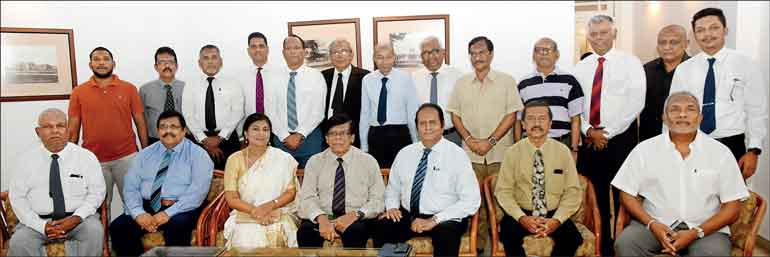Wednesday Feb 18, 2026
Wednesday Feb 18, 2026
Friday, 6 June 2025 00:04 - - {{hitsCtrl.values.hits}}


PPA Chairman Dr Janaki Kuruppu

PPA Chief Operating Officer
Dyan Seneviratne
In the lush hills and tropical lowlands of Sri Lanka, a quiet revolution is stirring—one that seeks not just to revive but to radically transform the plantation sector. The Proprietary Planters Alliance (PPA) has emerged as a game-changing force with a clear mission: to give voice, vision, and viability to proprietary planters—Sri Lanka’s underrepresented yet vital stakeholders in agriculture.
At a time when global markets demand traceability, value-chain efficiency, environmental stewardship, and ethical labour practices, the plantation sector remains burdened by archaic structures and fragmented representation. This is the void the PPA is built to fill. With this intention in mind, PPA inaugurated its operations on 1 June, at a simple ceremony held at the Orient Club – Colombo.
The Office Bearers appointed are: Founder Dammika Kobbekaduwa Chairperson Dr. Janaki Kuruppu, Directors: Dr. Dilhan Sampath Jayatilleke, Upananda Karunaratne, Dr. R.A.D. Kumarawickrama, Dr. W.G. Somaratne, Rehan Jayathilake, S.M.P. Jayantha, Arjun Dharmadasa, Dr. Nadaraja Rejendran and Dyan Seneviratne.
PPA said for decades, proprietary planters—those who own and operate small to mid-sized tea, rubber, coconut, spice, and fruit estates—have lacked a centralised platform to lobby for policy, access finance, and leverage innovations. Unlike corporate plantations, these planters rarely benefit from RandD, climate adaptation schemes, digital agri-tools, or direct trade exposure.
Meanwhile, national goals like doubling the GDP to $ 160 billion and making Sri Lanka a smart agricultural hub are simply unattainable without tapping into the true potential of these grassroots actors.
PPA bridges this divide by acting as: A policy think-tank, a technical innovation platform, a channel for climate finance and ESG compliance and a collaborative hub for agri-tourism, value addition, and sustainable exports.
Its vision is to create a resilient, sustainable, and globally competitive proprietary plantation sector in Sri Lanka that leads in innovation, value addition, and ethical agricultural practices.
The mission is to empower proprietary planters through unified representation, advanced agronomy, policy advocacy, climate-smart innovations, and integrated value-chain management—enabling prosperity from plot to port.
PPA’s strategic goals are:
At the launch of PPA, the Colombo Declaration was ratified as a defining milestone.
It is a formal charter of unity, purpose, and transformation for Sri Lanka’s proprietary plantation community. This Declaration is not just a ceremonial pledge; it is the institutional backbone of a national movement toward a climate-smart, value chain-driven, and people-first plantation model.
PPA said the Declaration reinforces key commitments including ESG-driven agriculture, HRM-centered workforce transformation, policy engagement, and access to global green finance. By aligning proprietary planters around these shared objectives, the Colombo Declaration directly contributes to closing the productivity and market access gaps that have historically limited the sector’s GDP contribution.
In essence, the Colombo Declaration positions PPA as a strategic national instrument to unlock the latent economic value in Sri Lanka’s plantation economy—potentially adding billions to the country’s agri-GDP through inclusive, sustainable growth.
Why every proprietary planter must join
1. Power in numbers:
Alone, a planter is a commodity producer. As a member of PPA, you become part of a national movement with lobbying power, donor engagement, and export linkages.
2. Tools of the future:
Access the latest in satellite crop monitoring, regenerative soil tech, and climate insurance models.
3. Policy access:
Be at the decision-making table—on issues ranging from subsidy allocation to land reform and smart agri-investments.
4. Climate and ESG compliance:
Get certified, get recognised, and get financed. PPA’s alignment with global standards allows members to qualify for carbon credits, green loans, and sustainability-linked certifications.
5. Shared prosperity:
PPA offers a space for collaboration—not competition—among fellow planters, innovators, and financiers.
While rooted in Sri Lanka, PPA offers a scalable model for tropical countries across Asia, Africa, and Latin America—regions with similar plantation legacies and rural enterprise structures. Whether it’s nutmeg in Kerala, coffee in Ethiopia, or cacao in Ecuador, the proprietary planter model remains a potent but under-leveraged development tool.
PPA said the time for waiting is over. “Whether you’re a third-generation tea grower in Kandy, a cinnamon cultivator in Matara, or a fruit planter in Monaragala, the PPA is your passport to relevance, resilience, and returns,” it said.
Colombo Declaration KPIs:
Macro Impact to GDP: If even 30% of Sri Lanka’s 200,000+ proprietary holdings align with PPA’s Colombo Declaration framework, it could conservatively add Rs. 300–500 billion annually in value-added export earnings and agri-tourism—boosting national GDP by over 1.5% points within five years.
Pix by Shehan Gunasekera